





The use of medicinal mushrooms is a fascinating topic with a rich history that spans over 5000 years in culture across the world from Europe to China.
Mushrooms are not actually plants – they belong to a separate group of organisms called fungi. The Greek physician Hippocrates, the guy famous for the saying “let thy food be thy medicine and thy medicine be thy food, first classified mushrooms as a potent anti-inflammatory and for cauterizing wounds some 2500 years ago. From ancient China to modern-day Japan and beyond, mushrooms have been valued for their healing properties and have played an important role in many traditional healing systems around the world.
In the 20th century, the discovery of penicillin, a type of mold that produces an antibiotic, revolutionized medicine and saved countless lives. This led to increased interest in the study of fungi and their potential medicinal properties.
Today, functional mushrooms are gaining popularity as a natural and holistic approach to health and wellness. Whether you’re looking to boost your immune system, support cognitive function, or simply promote overall health and well-being, medicinal mushrooms may offer a natural and effective solution.
Cordyceps is a type of parasitic fungus that grows on the larvae of various insects, particularly moths. It has been used in traditional Chinese medicine for centuries, and modern research has shown that it may have a few health benefits
· One of the primary benefits of cordyceps is its potential to improve athletic performance. Several studies have shown that cordyceps can increase oxygen uptake, which may improve endurance and reduce fatigue during exercise. It may also increase ATP production, which is important for energy and muscle function.
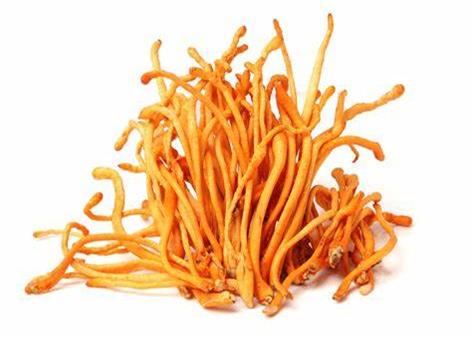
. One of the primary benefits of cordyceps is its potential to improve athletic performance. Several studies have shown that cordyceps can increase oxygen uptake, which may improve endurance and reduce fatigue during exercise. It may also increase ATP production, which is important for energy and muscle function.
.Cordyceps may also have anti-inflammatory and antioxidant properties, which could make it beneficial for several health conditions. It may be helpful for reducing inflammation in the lungs and improving respiratory function, which could be beneficial for people with asthma or chronic obstructive pulmonary disease (COPD).
. Additionally, some studies have shown that cordyceps may have immune-boosting properties. It may increase the production of certain immune cells and improve the body’s response to infections. This could be particularly useful for people with weakened immune systems.
. Cordyceps may also have potential benefits for cardiovascular health. It may help lower blood pressure and improve circulation, which could reduce the risk of heart disease. It may also help lower cholesterol levels and reduce inflammation in the arteries.
. Finally, cordyceps may have anti-aging properties. It may help protect against oxidative stress and reduce inflammation, which are both factors that can contribute to aging. Some studies have also suggested that cordyceps may improve cognitive function and memory.
Overall, cordyceps is a fascinating fungus with a wide range of potential health benefits. While more research is needed to fully understand its effects on human health, there is some evidence to suggest that it may be useful for improving athletic performance, reducing inflammation, boosting the immune system, and promoting cardiovascular and cognitive health. As with any supplement, it is important to talk to your doctor before adding cordyceps to your routine.
Lion’s mane (Hericium erinaceus) is a type of edible mushroom that is native to North America, Europe, and Asia. It is named after its shaggy appearance, which resembles the mane of a lion. Lion’s mane has been used in traditional Chinese medicine for centuries, and modern research has revealed numerous potential health benefits.
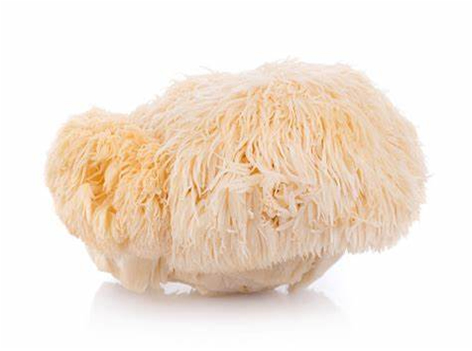
· One of the most well-known benefits of lion’s mane is its ability to improve cognitive function. Studies have shown that lion’s mane contains compounds called erinacines and hericenones, which have been found to stimulate the growth of nerve cells in the brain. This can potentially improve memory, concentration, and overall brain function.
· Lion’s mane has also been shown to have anti-inflammatory and antioxidant properties. Inflammation is a natural response by the body to injury or infection, but chronic inflammation can lead to a variety of health problems.Lion’s mane may help reduce chronic inflammation and prevent oxidative stress, which can cause cell damage and lead to disease.
. In addition to its potential cognitive and anti-inflammatory benefits, lion’s mane may also have other health benefits. For example, studies have shown that it may help reduce symptoms of depression and anxiety, as well as improve sleep quality. It may also help boost the immune system and reduce the risk of certain types of cancer.
. One of the unique properties of lion’s mane is its potential to stimulate the growth of nerve cells in the peripheral nervous system. This can potentially help with conditions such as peripheral neuropathy, which is a type of nerve damage that can cause pain, numbness, and tingling in the hands and feet.
. Lion’s mane is also a good source of several important nutrients, including protein, fiber, and various vitamins and minerals. It is also low in calories and fat, making it a good choice for those looking to maintain a healthy weight.
Overall, lion’s mane is a promising natural remedy that may have a variety of health benefits. It is available in supplement form and can be found in many health food stores. As with any supplement or natural remedy, it is important to speak with a healthcare professional before taking lion’s mane, especially if you are pregnant, breastfeeding, or have any underlying health conditions.
Reishi, also known as Ganoderma lucidum, is a type of mushroom that has been used for medicinal purposes in traditional Chinese medicine for over 2,000 years. It is a popular ingredient in many health supplements and herbal remedies due to its numerous health benefits.
· One of the primary benefits of Reishi Mushroom is its ability to boost the immune system. It contains beta-glucans, which are complex polysaccharides that stimulate the production of immune cells in the body. This can help to improve the body’s ability to fight off infections and illnesses.
. Also known for its anti-inflammatory properties. It contains triterpenes, which are compounds that have been shown to have anti-inflammatory effects. This can be particularly beneficial for individuals with chronic inflammatory conditions such as arthritis.
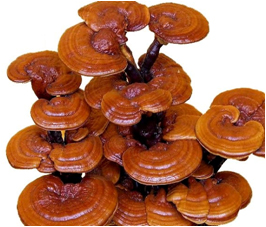
· In addition, Reishi has been shown to have antioxidant properties, which can help to protect the body against oxidative stress. Oxidative stress is a process that occurs when there is an imbalance between free radicals and antioxidants in the body. This can lead to damage to cells and tissues and has been linked to a variety of health problems.
· Another potential health benefit of Reishi is its ability to support liver health. Reishi has been shown to have a protective effect on the liver, helping to prevent damage from toxins and other harmful substances. This can be particularly beneficial for individuals who are at risk of liver damage due to alcohol or drug use.
· Finally, Reishi may also have a calming effect on the body and can help to reduce stress and anxiety. It contains compounds that have been shown to have a relaxing effect on the nervous system, helping to promote a sense of calm and relaxation.
Overall, Reishi is a highly beneficial mushroom that has been used for centuries for its medicinal properties. Its ability to boost the immune system, reduce inflammation, and protect against oxidative stress make it a valuable addition to any health regimen.
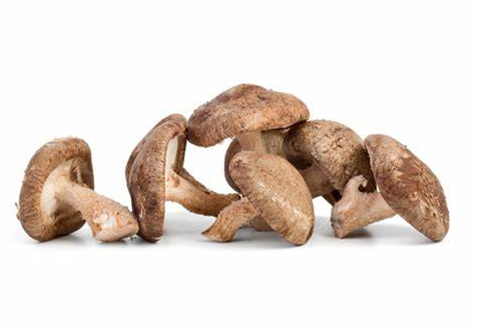
· One of the main health benefits of shiitake mushrooms is their potential to support the immune system. Shiitake mushrooms contain beta-glucans, a type of complex carbohydrate that may help to stimulate the immune system. Some research suggests that consuming shiitake mushrooms may improve the body’s ability to fight off infections and diseases.
· Shiitake mushrooms are also a good source of antioxidants, which may help to protect the body against oxidative stress and inflammation. Shiitake mushrooms contain the antioxidant ergothioneine, which has been linked to a reduced risk of chronic diseases.
· In addition to their immune-boosting and antioxidant properties, shiitake mushrooms may also have anti-inflammatory effects. Inflammation is a natural response of the body to injury or infection, but chronic inflammation can lead to a variety of health problems. Some studies suggest that consuming shiitake mushrooms may help to reduce inflammation in the body, which could potentially reduce the risk of chronic diseases.
· Shiitake mushrooms are also a good source of vitamins and minerals, including B vitamins, vitamin D, and selenium. B vitamins are important for energy production and nerve function, while vitamin D is essential for bone health and immune function. Selenium is a mineral that is important for thyroid function and immune health.
Maitake mushrooms, also known as hen-of-the-woods mushrooms, are a type of edible mushroom that grows in clusters at the base of trees, particularly oak trees. These mushrooms have been used for centuries in traditional medicine in Japan and China for their potential health benefits.
It’s worth noting that while there is some promising research on the potential health benefits of maitake mushrooms, more high-quality studies are needed to fully understand their effects on human health. In addition, people who are taking medications or have underlying health conditions should speak with a healthcare professional before incorporating maitake mushrooms into their diet, as they may interact with certain medications or exacerbate certain health conditions.
· One of the key components of maitake mushrooms is beta-glucans, which are complex sugars found in the cell walls of many types of mushrooms. Beta-glucans have been shown to stimulate the immune system and enhance the body’s ability to fight off infections and diseases.
· Maitake mushrooms are also a good source of antioxidants, which are compounds that help to protect the body from damage caused by harmful free radicals. Antioxidants have been linked to a reduced risk of chronic diseases.
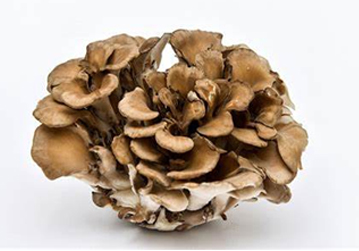
· In addition to their immune-boosting and antioxidant properties, maitake mushrooms have also been studied for their potential to lower blood sugar levels and improve insulin sensitivity in people with diabetes. Some research has suggested that maitake mushrooms may help to regulate blood glucose levels by increasing insulin sensitivity and promoting glucose uptake by cells.
· Other potential health benefits of maitake mushrooms include their ability to lower cholesterol levels and improve heart health, reduce inflammation and oxidative stress.
Maitake mushrooms can be enjoyed in a variety of ways, including sautéed, roasted, or grilled, and can also be added to soups, stews, and stir-fries. They are available fresh or dried in many grocery stores and online retailers, and can be a nutritious and flavorful addition to a healthy diet.
Chaga mushrooms, also known as Inonotus obliquus, are a type of fungus that grows on birch trees in cold regions like Siberia, Alaska, and northern Canada. Chaga mushrooms have been used for centuries in traditional medicine for their health benefits. In recent years, they have gained popularity as a superfood due to their high antioxidant content.
Chaga mushrooms are rich in antioxidants, which are compounds that protect the body from damage caused by free radicals. Free radicals are unstable molecules that can cause cellular damage and contribute to aging and the development of various diseases. The antioxidants in chaga mushrooms may help reduce inflammation and oxidative stress.
Chaga mushrooms are also rich in polysaccharides, which are complex carbohydrates that support the immune system. Polysaccharides have been shown to stimulate the production of white blood cells, which are the body’s primary defense against infections. Additionally, chaga mushrooms contain beta-glucans, which are another type of polysaccharide that have been shown to reduce inflammation, lower cholesterol levels, and improve immune function.
Chaga mushrooms are also a good source of melanin, a pigment that gives color to the skin, hair, and eyes. Melanin has been shown to protect the skin from UV damage and may help prevent skin cancer. Chaga mushrooms may also help improve skin health by promoting collagen production and reducing the appearance of fine lines and wrinkles.
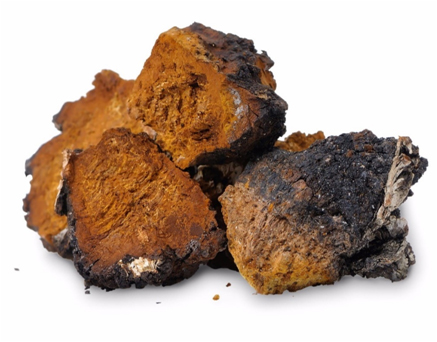
· Improving digestion: Chaga mushrooms contain dietary fiber, which can help regulate bowel movements and support the growth of healthy gut bacteria.
· Supporting liver health: Chaga mushrooms have been shown to have liver-protective properties and may help reduce the risk of liver damage caused by toxins.
Chaga mushrooms can be consumed in various forms, including tea, tincture, powder, and capsules. It’s essential to source chaga mushrooms from a reputable supplier, as they can be easily contaminated with harmful substances if harvested from polluted areas. It’s also important to note that while chaga mushrooms have been shown to have health benefits, they should not be used as a substitute for medical treatment. It’s always best to consult with a healthcare professional before using chaga mushrooms or any other natural remedy.
· One of the main active compounds in turkey tail mushrooms is polysaccharide-K (PSK), which has been shown in some studies to have immune-boosting properties. PSK has been found to stimulate the production of natural killer cells, which are an important part of the body’s immune system. This may help to improve the body’s ability to fight off infections and diseases.
· Turkey tail mushrooms are also rich in antioxidants, which can help to protect the body from oxidative stress and damage caused by free radicals. Turkey tail mushrooms contain a type of antioxidant called phenols, which have been linked to a range of potential health benefits. For example, some studies have suggested that phenols may help to reduce inflammation, lowering the risk of heart disease.
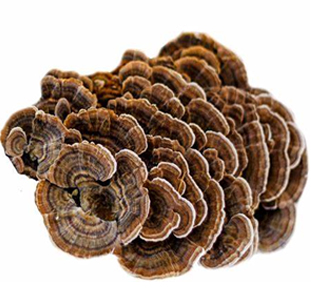
· In addition to these potential health benefits, turkey tail mushrooms have also been studied for their effects on gut health. Some research has suggested that turkey tail mushrooms may help to promote the growth of beneficial gut bacteria, which can have a range of positive effects on overall health. This may be due to the prebiotic fibers found in turkey tail mushrooms, which can help to feed and support the growth of probiotic bacteria in the gut.
Overall, while more research is needed to fully understand the potential health benefits of turkey tail mushrooms, early studies suggest that they may have immune-boosting, antioxidant, and gut health-promoting properties. These mushrooms can be consumed as a supplement or added to soups, stews, and other dishes for their potential health benefits. However, as with any supplement or natural remedy, it is important to consult with a healthcare professional before incorporating turkey tail mushrooms into your diet or healthcare regimen.
The fruiting body is the visible part of the mushroom, often referred to as the cap or the mushroom itself. The mycelium, on the other hand, is the underground network of thread-like structures that the mushroom grows from. Mycelium is often used in mushroom supplements as a cheaper alternative to the fruiting body, as they usually contain the growing medium (starch), as there is no way to separate it from the mycelium network.
One of the key differences between the fruiting body and the mycelium is the concentration of beneficial compounds. Fruiting bodies contain a higher concentration of beta-glucans, polysaccharides, and other beneficial compounds than mycelium.
Another important difference between the fruiting body and mycelium is their chemical composition. The two contain different ratios of bioactive compounds, including triterpenoids, sterols, and ergosterol. Fruiting bodies tend to have a higher concentration of triterpenoids, which have been shown to have anti-inflammatory and anti-cancer properties.
In addition to their different chemical profiles, fruiting bodies and mycelium may also have different effects on the body. Some studies suggest that the beta-glucans in the fruiting body may be more effective at stimulating the immune system than those in the mycelium. Other studies have found that the triterpenoids in the fruiting body may have anti-cancer and anti-inflammatory effects.
Overall, while mycelium can be a cheaper alternative to the fruiting body, it may not have the same concentration of beneficial compounds or the same health benefits. That’s not to say that mycelium is without its benefits, but for those looking to get the most out of their mushroom supplements, can be rest assured with Mushroom Support products by Current Naturals, you will get a pure and potent supplement.
Mushrooms are not a cure-all, however these medicinal mushrooms should be looked at as an adjunct to your daily routine. Mushrooms take some time, generally about 3 to 4 weeks to start working, it is not an overnight process, so exercise some patience, it will be well worth it. These powerful fungi may deliver the following benefits:
· Support for the Nervous system
· Boost immunity
· Help with Anti-Aging
· Support Brain health and cognition
· Increase energy and stamina.
· Serve as an anti-inflammatory
· Help to reduce stress and anxiety
· Improve mood and manage depression
· Helps as an anti-inflammatory
· Full of antioxidants.
While the mushrooms provided by Current Naturals are generally regarded as safe to consume, we recommend always consulting your doctor before adding any supplement to your treatment.
Free shipping for orders over $100
Within 30 days for a exchange
Chat with us during normal business hours Available 8:30am- 5:00pm
Pay with multiple Credit Cards